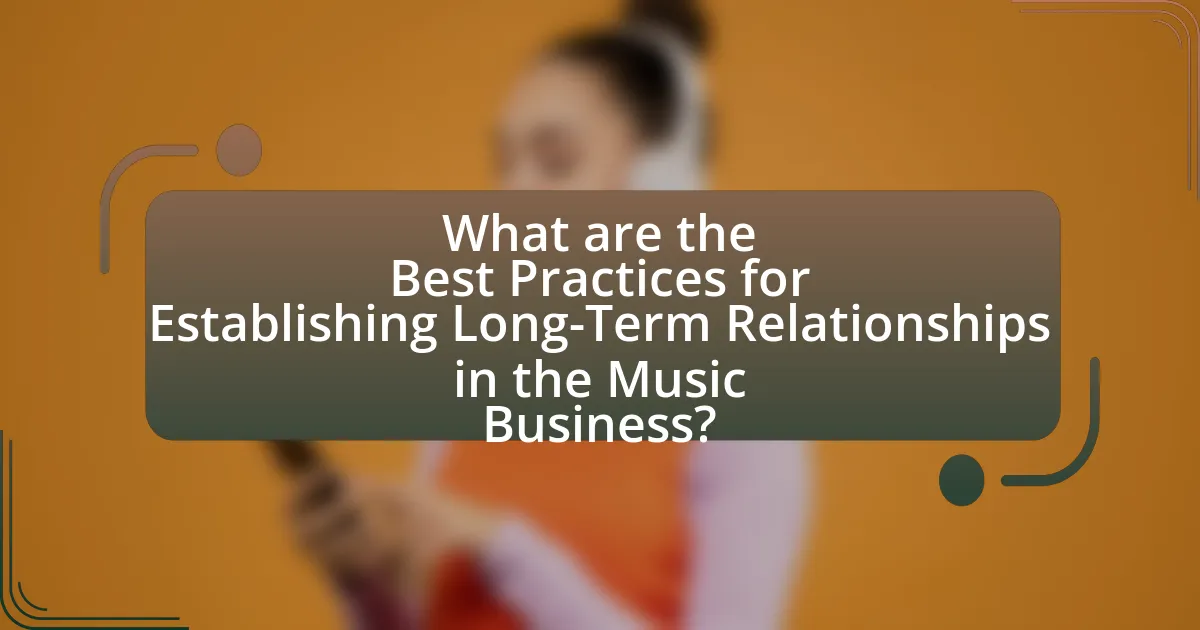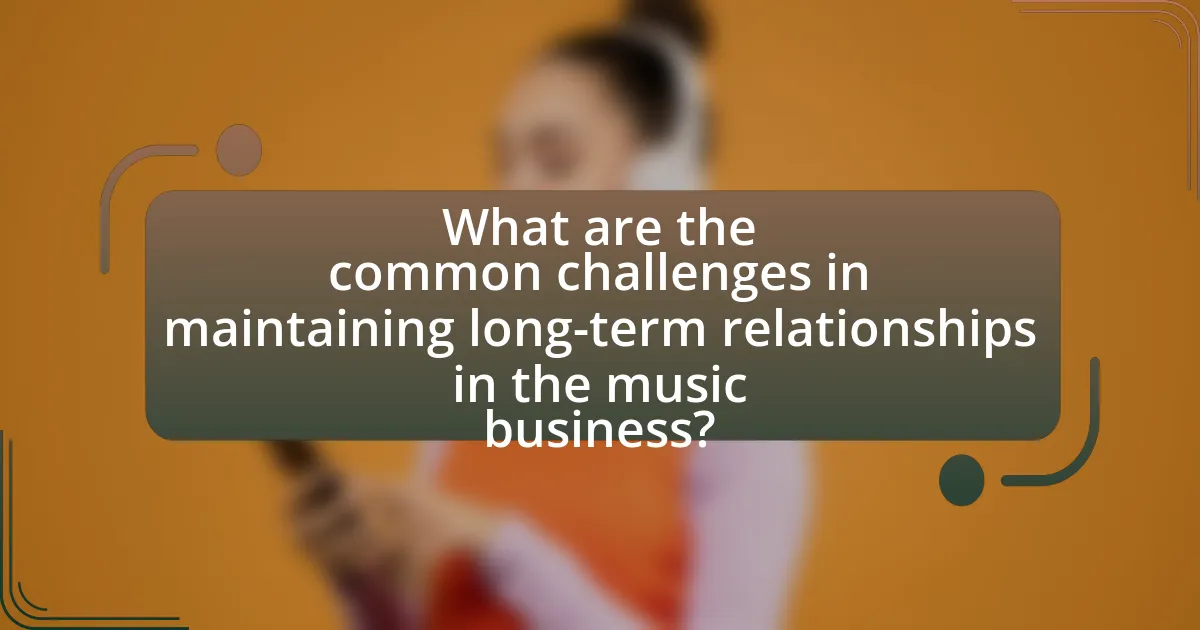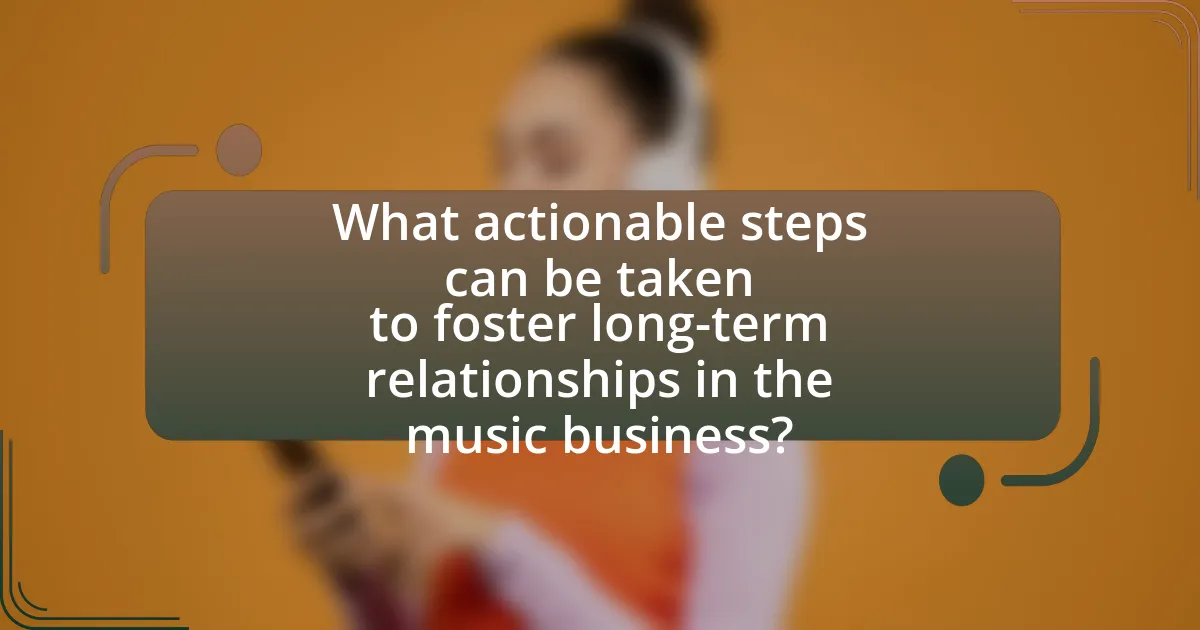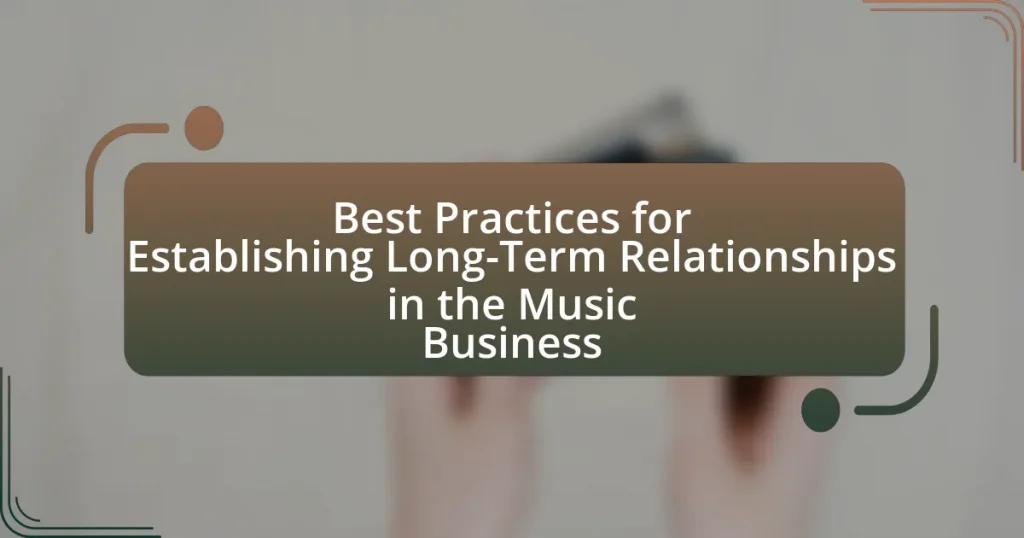The article focuses on best practices for establishing long-term relationships in the music business, emphasizing the importance of consistent communication, mutual respect, and collaboration. It outlines how these practices foster trust and stability, which are crucial for career longevity and successful partnerships among artists, producers, and industry professionals. Additionally, the article discusses the impact of relationships on collaboration opportunities, the significance of effective communication and trust, and strategies for networking and conflict resolution. It also highlights common challenges in maintaining relationships and actionable steps to nurture them over time, ultimately underscoring the role of gratitude and mentorship in relationship development within the music industry.

What are the Best Practices for Establishing Long-Term Relationships in the Music Business?
The best practices for establishing long-term relationships in the music business include consistent communication, mutual respect, and collaboration. Consistent communication fosters transparency and trust, which are essential for any successful partnership. Mutual respect ensures that all parties value each other’s contributions and perspectives, leading to a more harmonious working environment. Collaboration on projects not only enhances creativity but also strengthens bonds, as working together towards common goals creates shared experiences. Research indicates that strong relationships in the music industry can lead to increased opportunities and longevity, as evidenced by successful partnerships like those between artists and their managers or record labels, which often thrive on these foundational practices.
Why are long-term relationships important in the music industry?
Long-term relationships are important in the music industry because they foster trust, collaboration, and stability, which are essential for sustained success. Trust built over time allows artists, producers, and industry professionals to work more effectively together, leading to higher quality projects and innovative ideas. For instance, established partnerships often result in better promotional opportunities and access to resources, as seen with successful collaborations like those between artists and their long-term managers or record labels. Additionally, long-term relationships can lead to a loyal fan base, as consistent engagement with audiences builds a deeper connection, ultimately driving sales and concert attendance.
How do long-term relationships impact career longevity for artists?
Long-term relationships positively impact career longevity for artists by providing consistent support, collaboration opportunities, and stability in their professional lives. These relationships often lead to increased visibility and access to resources, which can enhance an artist’s career trajectory. For instance, artists who maintain long-term partnerships with managers, producers, and collaborators are more likely to secure ongoing projects and funding, as evidenced by studies showing that artists with strong networks experience higher rates of success and longevity in their careers. Additionally, emotional support from long-term relationships can help artists navigate the challenges of the industry, reducing burnout and promoting sustained creativity.
What role do relationships play in collaboration opportunities?
Relationships are crucial in creating collaboration opportunities within the music business. Strong relationships foster trust and open communication, which are essential for successful partnerships. For instance, artists who maintain good relationships with producers and other musicians are more likely to collaborate on projects, leading to innovative music and expanded networks. Research indicates that 70% of successful collaborations stem from pre-existing relationships, highlighting their importance in facilitating joint ventures and creative exchanges.
What key elements contribute to successful relationships in the music business?
Successful relationships in the music business are primarily built on trust, communication, and mutual respect. Trust fosters collaboration and encourages artists and industry professionals to share creative ideas without fear of exploitation. Effective communication ensures that all parties are aligned on goals, expectations, and feedback, which is crucial in a dynamic industry. Mutual respect acknowledges the value each individual brings to the table, promoting a positive working environment. Research indicates that strong interpersonal relationships can lead to increased opportunities and longevity in careers, as evidenced by successful partnerships like those between artists and their managers, which often result in higher revenue and sustained artistic growth.
How does effective communication enhance relationships?
Effective communication enhances relationships by fostering understanding and trust between individuals. When parties engage in clear and open dialogue, they can express their thoughts, feelings, and needs more effectively, which reduces misunderstandings and conflicts. Research indicates that effective communication skills, such as active listening and empathy, are crucial in building rapport and maintaining long-term connections. For instance, a study published in the Journal of Business Communication found that organizations with strong communication practices experience higher employee satisfaction and retention rates, demonstrating the direct impact of communication on relationship longevity.
What is the significance of trust in the music industry?
Trust is crucial in the music industry as it fosters collaboration, enhances reputation, and drives long-term relationships among artists, producers, and stakeholders. When trust is established, artists are more likely to collaborate with producers and labels, leading to innovative projects and successful outcomes. For instance, a survey by the Music Industry Research Association found that 85% of music professionals believe trust significantly impacts their willingness to work together. Additionally, trust enhances an artist’s reputation, as stakeholders are more inclined to promote and support those they trust, ultimately influencing audience perception and market success.
How can networking be optimized for relationship building?
Networking can be optimized for relationship building by focusing on genuine engagement and mutual benefit. Establishing authentic connections through active listening, personalized communication, and consistent follow-up fosters trust and rapport. Research indicates that 70% of people value personal connections over transactional interactions, highlighting the importance of relationship-oriented networking. By prioritizing quality interactions and demonstrating a willingness to support others, individuals can create a strong network that enhances collaboration and opportunities in the music business.
What strategies can artists use to expand their network?
Artists can expand their network by actively participating in industry events, collaborating with other musicians, and utilizing social media platforms. Engaging in music festivals, conferences, and workshops allows artists to meet industry professionals and peers, fostering valuable connections. Collaboration with other musicians not only enhances creativity but also exposes artists to each other’s audiences, broadening their reach. Additionally, leveraging social media platforms like Instagram and Twitter enables artists to showcase their work, interact with fans, and connect with industry influencers, which is crucial for networking in the digital age. According to a survey by the Music Industry Research Association, 70% of artists reported that networking at events significantly contributed to their career growth.
How can social media be leveraged for relationship development?
Social media can be leveraged for relationship development by facilitating direct communication and engagement between artists and their audience. Platforms like Instagram, Twitter, and Facebook allow musicians to share personal stories, behind-the-scenes content, and updates, fostering a sense of connection and community. Research indicates that 70% of consumers feel more connected to brands when the brand engages with them on social media, highlighting the effectiveness of these platforms in building relationships. Additionally, social media enables artists to collaborate with other musicians and industry professionals, expanding their network and enhancing their visibility in the music business.

What are the common challenges in maintaining long-term relationships in the music business?
Common challenges in maintaining long-term relationships in the music business include communication breakdowns, differing artistic visions, and financial disputes. Communication breakdowns often arise due to the fast-paced nature of the industry, leading to misunderstandings and unmet expectations. Differing artistic visions can create friction between collaborators, as individual goals may not align, resulting in conflicts over creative direction. Financial disputes frequently occur due to the complexities of revenue sharing, contract negotiations, and the pressure of financial instability in the industry. These challenges can jeopardize partnerships and hinder the sustainability of relationships in the music business.
What obstacles do artists face in sustaining relationships?
Artists face several obstacles in sustaining relationships, primarily due to the demands of their careers, emotional challenges, and lifestyle choices. The intense schedule of performances, recording sessions, and promotional activities often leads to time constraints that hinder meaningful interactions with partners and friends. Additionally, the emotional highs and lows associated with creative work can create instability in relationships, as artists may struggle with anxiety, depression, or self-doubt. Furthermore, the lifestyle of touring and frequent travel can lead to physical distance, making it difficult to maintain consistent communication and connection. These factors collectively contribute to the challenges artists encounter in nurturing and sustaining their personal relationships.
How can misunderstandings be avoided in professional interactions?
Misunderstandings in professional interactions can be avoided by ensuring clear and open communication. Establishing a common understanding of goals, expectations, and responsibilities through regular check-ins and feedback sessions significantly reduces ambiguity. Research indicates that effective communication practices, such as active listening and confirming understanding, lead to fewer conflicts and enhanced collaboration. For instance, a study published in the Journal of Business Communication found that organizations with structured communication protocols experience 25% fewer misunderstandings.
What are the effects of competition on relationships?
Competition can negatively impact relationships by fostering jealousy, mistrust, and conflict among individuals. In the music business, where artists and professionals often vie for the same opportunities, this competitive atmosphere can lead to strained collaborations and diminished trust. Research indicates that competition can create a zero-sum mindset, where one party’s gain is perceived as another’s loss, ultimately undermining teamwork and mutual support essential for long-term success in the industry. For instance, a study published in the Journal of Personality and Social Psychology found that competitive environments can lead to decreased cooperation and increased hostility, which are detrimental to relationship-building in collaborative fields like music.
How can conflicts be resolved to preserve relationships?
Conflicts can be resolved to preserve relationships by employing effective communication strategies and active listening. Engaging in open dialogue allows parties to express their perspectives and feelings, which fosters understanding. Research indicates that using “I” statements instead of “you” accusations reduces defensiveness and promotes constructive conversation. For instance, a study published in the Journal of Conflict Resolution highlights that collaborative problem-solving techniques, such as brainstorming solutions together, lead to more satisfactory outcomes and strengthen relationships. By focusing on shared goals and mutual respect, individuals can navigate conflicts while maintaining and even enhancing their connections.
What techniques can be used for effective conflict resolution?
Effective conflict resolution techniques include active listening, mediation, and collaborative problem-solving. Active listening involves fully concentrating on the speaker, understanding their message, and responding thoughtfully, which fosters mutual respect and understanding. Mediation employs a neutral third party to facilitate discussions, helping conflicting parties reach a mutually acceptable agreement. Collaborative problem-solving encourages all parties to work together to identify solutions that satisfy everyone’s needs, promoting a sense of partnership. These techniques are supported by research indicating that effective communication and cooperation lead to more sustainable resolutions in interpersonal relationships, particularly in high-stakes environments like the music business.
How important is compromise in maintaining relationships?
Compromise is crucial in maintaining relationships, particularly in the music business where collaboration is essential. It fosters mutual understanding and respect, allowing parties to navigate differing opinions and interests effectively. Research indicates that successful partnerships often hinge on the ability to find common ground; for instance, a study published in the Journal of Social and Personal Relationships found that couples who practice compromise report higher relationship satisfaction. This highlights that compromise not only resolves conflicts but also strengthens bonds, making it a fundamental practice for long-term success in the music industry.

What actionable steps can be taken to foster long-term relationships in the music business?
To foster long-term relationships in the music business, professionals should prioritize consistent communication and collaboration. Regularly engaging with artists, managers, and industry stakeholders through meetings, emails, and social media helps build trust and rapport. Additionally, offering support through shared resources, such as marketing efforts or networking opportunities, strengthens these connections. Research indicates that 70% of successful partnerships in the music industry stem from effective communication and mutual benefit, highlighting the importance of these actionable steps.
What daily practices can strengthen relationships?
Daily practices that can strengthen relationships include consistent communication, active listening, and expressing appreciation. Consistent communication fosters trust and transparency, which are essential in any relationship. Active listening demonstrates respect and understanding, allowing individuals to feel valued and heard. Expressing appreciation, whether through verbal affirmations or small gestures, reinforces positive feelings and encourages ongoing connection. Research indicates that relationships characterized by regular positive interactions are more resilient and satisfying, highlighting the importance of these daily practices in maintaining strong bonds.
How can regular check-ins improve relationship quality?
Regular check-ins can significantly improve relationship quality by fostering open communication and addressing issues promptly. These interactions create a structured opportunity for partners to express their thoughts and feelings, which can lead to increased trust and understanding. Research indicates that consistent communication is linked to higher relationship satisfaction, as it allows for the resolution of misunderstandings before they escalate. For instance, a study published in the Journal of Social and Personal Relationships found that couples who engaged in regular check-ins reported greater emotional intimacy and satisfaction compared to those who did not. This evidence underscores the importance of regular check-ins in maintaining and enhancing the quality of relationships in the music business and beyond.
What role does gratitude play in relationship maintenance?
Gratitude plays a crucial role in relationship maintenance by fostering positive interactions and reinforcing bonds between individuals. Expressing gratitude enhances feelings of appreciation and respect, which are essential for sustaining long-term relationships. Research indicates that gratitude can lead to increased relationship satisfaction, as it encourages partners to recognize and value each other’s contributions. A study published in the Journal of Personality and Social Psychology found that individuals who regularly express gratitude towards their partners report higher levels of relationship quality and commitment. This demonstrates that gratitude not only strengthens emotional connections but also promotes a supportive environment conducive to relationship longevity.
What resources are available for relationship building in the music industry?
Networking events, industry conferences, and online platforms are key resources for relationship building in the music industry. Networking events, such as SXSW and Music Biz Conference, provide opportunities for artists, producers, and industry professionals to connect and collaborate. Online platforms like LinkedIn and social media channels facilitate ongoing communication and relationship management, allowing individuals to share their work and engage with others in the industry. Additionally, organizations like the Recording Academy and ASCAP offer networking opportunities and resources for members, further enhancing relationship-building efforts.
How can mentorship programs facilitate relationship growth?
Mentorship programs facilitate relationship growth by providing structured guidance and support that fosters trust and communication between mentors and mentees. These programs create opportunities for networking, skill development, and knowledge sharing, which are essential for building strong professional connections. Research indicates that mentorship can lead to increased job satisfaction and career advancement, as seen in a study by Allen et al. (2004) published in the Journal of Applied Psychology, which found that mentees often report higher levels of career success and satisfaction compared to those without mentors. This structured interaction not only enhances individual growth but also strengthens the overall network within the music business, promoting long-term relationships.
What networking events should artists consider attending?
Artists should consider attending music festivals, industry conferences, and local art exhibitions as key networking events. Music festivals like South by Southwest (SXSW) and Coachella provide opportunities to connect with industry professionals, fellow artists, and potential collaborators. Industry conferences such as the Music Business Association Conference and ASCAP Expo offer panels, workshops, and networking sessions tailored to artists. Local art exhibitions and gallery openings allow artists to meet curators, collectors, and other creatives in their community, fostering relationships that can lead to future opportunities. These events are essential for building a network that supports long-term success in the music business.
What are the best practices for nurturing relationships over time?
The best practices for nurturing relationships over time in the music business include consistent communication, mutual support, and shared experiences. Consistent communication fosters trust and keeps all parties informed about developments, while mutual support involves actively promoting each other’s work and celebrating successes. Shared experiences, such as attending events together or collaborating on projects, strengthen bonds and create lasting memories. Research indicates that relationships built on these principles are more likely to endure, as they create a foundation of loyalty and collaboration essential in the dynamic music industry.
How can artists stay relevant to their contacts?
Artists can stay relevant to their contacts by consistently engaging with them through personalized communication and sharing valuable content. Regular updates about their work, such as new releases, performances, or collaborations, help maintain interest and connection. According to a study by the Music Industry Research Association, artists who actively communicate with their network are 60% more likely to receive support for their projects. This consistent interaction fosters a sense of community and loyalty, ensuring that contacts remain informed and invested in the artist’s journey.
What are the benefits of collaboration in relationship building?
Collaboration in relationship building enhances trust, communication, and mutual support among individuals. When people work together, they share diverse perspectives and skills, leading to innovative solutions and stronger connections. Research indicates that collaborative efforts can increase relationship satisfaction and longevity, as seen in a study published in the Journal of Social and Personal Relationships, which found that cooperative interactions significantly improve relational quality. This evidence underscores the importance of collaboration in fostering enduring relationships, particularly in dynamic fields like the music business.
